Hey everyone. Are you dealing with a leaky basement or constant moisture issues indoors? Wet basements and moldy walls are the worst. The culprit is usually inadequate waterproofing on your foundation. Luckily, as per experts in the particular field like Industrial Supplies, high-performance solution exists – sheet membrane waterproofing.
In this article, we’ll explain what sheet membrane systems are, their benefits over other waterproofing methods, and key places they should be installed. You’ll learn why sheet membranes are a game changer for durable water protection. Let’s banish wet basements for good.
What is Sheet Membrane Waterproofing?
Sheet membrane waterproofing uses heavy-duty, rubberized asphalt sheets that are adhered and sealed to form an impenetrable moisture barrier.
The thick, flexible sheets are extremely effective at preventing water penetration through foundations and below-grade structures. Sheet membranes provide robust protection concrete alone can’t.
Why Use Sheet Membrane vs. Liquid Coatings
Liquid sealants and coatings are an alternate waterproofing method, but sheet membranes have key advantages:
- Thicker protection – membranes range from 30 to over 100 mils thick versus around 15-30 mils for liquids
- Longer lifespan – sheets often last over 25 years versus 2-5 years for liquid coatings
- Seamless water barrier – sheets can join for a continuous seal whereas liquids have seems between applications
- Easier quality control – sheets are prefabricated under controlled conditions for reliability
For highest quality protection against heavy hydrostatic pressure, sheet membranes deliver.
Key Areas to Install Sheet Membranes
Here are prime spots to utilize sheet membrane waterproofing:
Basement Foundations
Installing a sheet membrane system on the exterior of your foundation walls and underside of basement slabs seals out moisture from the surrounding soil. This is the best way to create a dry basement.
Between Concrete Foundation Layers
Commercial buildings often use sheet membranes between foundation slab layers to prevent moisture migration and accumulation within the concrete over time.
Tunnels and Underpasses
In below-grade structures like tunnels, sheet membranes provide vital waterproofing to prevent leaks from the immense hydrostatic forces.
Planters and Retaining Walls
Lining planter boxes and retaining wall beds with sheet membranes keeps moisture from pooling at foundations or leaching through walls.
Flat Roof Decks
Applying sheet membrane liners under the topside waterproofing on flat roof decks adds extra insurance against leaks from standing water.
Plaza Decks and Green Roofs
Special ultra heavy-duty membranes safeguard demanding under-slab waterproofing needs on paved plaza decks and landscaped green roofs.
Below-Grade Commercial Spaces
Sheet membrane waterproofing is also invaluable for spaces like underground parking garages, commercial basements, and buried utility rooms. The extreme hydrostatic forces exerted require the thick, robust protection sheet membranes provide. Liquid coatings often cannot stand up to the intense pressure. Installing heavy-duty membranes against foundation walls and under slabs keeps moisture out of commercial below-grade spaces.
Conclusion
As you can see, Sheet membrane waterproofing uses heavy-duty, rubberized asphalt sheets that are adhered and sealed to form an impenetrable moisture barrier. sheet membrane waterproofing has so many applications. Correct installation by pros ensures reliable wetness protection for the long run. Give your next project a sheet membrane advantage.





